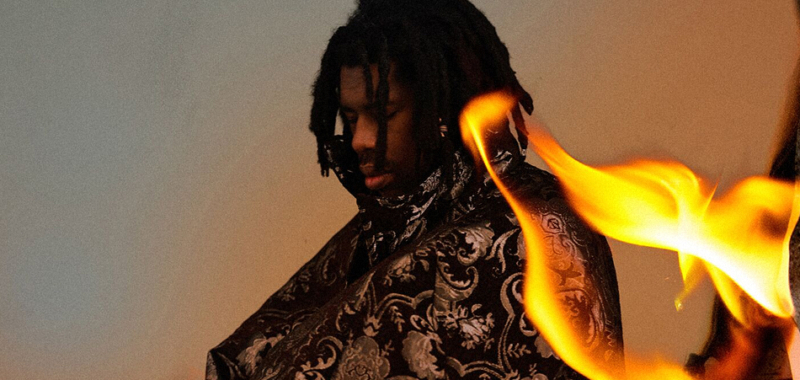Hip-hop’s reciprocal relationship with anime has been bumping and slashing along for years now, collaborating on a number of seminal projects and cutting a swathe across multimedia platforms before wiping the blade off and flicking an errant strand of hair away in slow-motion. A clear evolution of Wu Tang’s Shaolin style, it marks a continuation of the culture clash that keeps on giving. A high point of this union so far was the recent release of Yasuke, a new anime series on Netflix which tells the tale of the real historical figure of the same name, the first and only Black Samurai. Naturally, they have added robots, demons and magic, all topped off by eye-popping gore and a world-building soundtrack from experimental hip-hop pioneer Flying Lotus. Barely a day after the release of the series, the soundtrack was released to much anticipation and fanfare. Having directed his own horror film in 2017, the shall we say “visceral” Kuso, and picking up a writing credit for Yasuke, FlyLo is clearly becoming the renaissance man he was destined to be.
The music of the series is integral to setting every masterful scene, and it holds up as a beautiful piece of work when enjoyed separately. It did feel like a musical journey, even though I could never bring myself to say something like that. It is psychedelic, immersive, bombastic, unsettling, and a million other commonly used descriptors for Flying Lotus’ output. In the introduction alone, tribal drums underpin rapid fire hi-hats while mournful saxophone notes melt into neon synth lines, adding a powerful sense of drama without needing to refer to the source material to elaborate.
The theme tune to the series, “Black Gold”, features frequent FlyLo collaborator Thundercat. Usually known for more playful tones, some may have wondered how this would meld with the typically intense and serious world of samurai. Those people were of course exposed as fools. There is no facet of culture which could not be improved by that vibrating falsetto. The track dreamily recalls the unbridled emotion of classic anime themes, giving them the modern funk reboot. Thundercat’s allusions to the metaphorical possibilities on the sun took me back to the classic 80s anime The Mysterious Cities of Gold, and this is one minor example of what makes the soundtrack work as a whole. While Flying Lotus indulges his more esoteric impulses gleefully, he always manages to circle back to the classic anime music which serves as inspiration, keeping the sense of authenticity demanded from the legions of Anime-niacs.
As the album progresses, the style expertly switches from heartbreak to euphoria to beats Kill Bill would have killed for, Japanese percussion and Miami bass sharing the stage like it’s the most normal thing in the world. Flying Lotus’ well documented love of retro Japanese video games also shines through in some of the crunchy 8-bit melodies he deploys throughout. It’s a glorious mess overall, one I would describe as akin to floating in an isolation tank concealed within a 3D hologram of a Basquiat painting.
Denzel Curry steps into the fray for the track “African Samurai” and delivers a verse the famously anime-obsessed rapper seems to have been waiting his whole life to drop. The tone and references suggest a love and encyclopaedic knowledge of the subject, which is lucky as anything else would have been extremely jarring and detrimental to the soundscape.
“Blood-stained katanas, black man from Ghana
I battle over my honour and guided by Nobunaga
The power in every Kada has channelled most of my Oni
Years later, ended up scarred, broken and lonely”
As the album builds ominously to the inevitable crescendo, the darkness envelopes the listener and the astral plane becomes a very real consideration. Flying Lotus uses huge bass drops and Eastern samples in his audio collage to escalate the tension and disorientate the listener, to ensure they don’t get too comfortable bathing in the lush textures and realise that honour is at stake here. The drums of war get the adrenaline flowing and the ascending chord patterns let you know that this is a winnable fight. I feel like even explaining the rest of the album from this point might inadvertently provide spoilers for the series, so I will refrain. Suffice to say, it is a musical journey.
I recommend watching the series to attain the initial high, then using the soundtrack as a kind of daily application to maintain the high. This is the most efficient way to consume this content, although this may vary from person to person. The soundtrack is phenomenal on so many levels: as an indicator of the peerless talents of Flying Lotus, a celebration of this benchmark series, an example of the undeniable synergy and symmetry of anime and hip-hop and, incidentally, an awe-inspiring piece of music. Time to re-watch Samurai Champloo for the twelfth time.
Get the album here.
Connect with Flying Lotus: Facebook | Twitter | Instagram | YouTube









